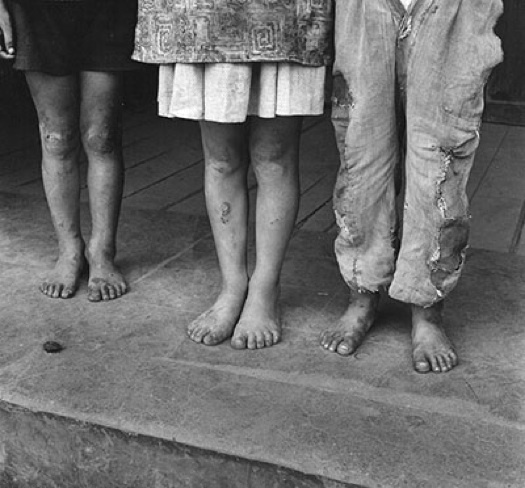 Milton Rogovin, from series on Chile, 1967.
Milton Rogovin, from series on Chile, 1967.The Islands and Rogovin
Pablo Neruda, Isla Negra, 1967
I did not know Milton Rogovin.
His letter asked me an uncommon question. He wanted to photograph the truth. I suggested that he come to our Southern-most part, to the Archipeligo, to Quemchi, to Chonchi, to the sleepy shores of the South of the Americas.
He arrived quickly, well equipped and efficient: North American. He came loaded down with lenses and cameras. He was too much for our simplicity. I recommended to him a good umbrella. He went ahead to the remote villages.
But he carried much more than his equipment. Patient eyes and searching. A heart sensitive to light, to rain, to shadows.
Soon he returned and left us. He returned to Kansas, Oregon, and Mississippi. But this time he took along with him a bouquet of wonderful images; the portrait of the truth. Portrait of humble truth that is lost in the inclemency of the islands.
Walls of the humble home with windows that open inward to the mythology, to the whispering, to the black clothes. Eyes, penetrating and dark, with sparks buried, like forgotten embers in fireplaces where once fire burned so intensely.
Rogovin photographed the silence. Left intact in their mystery those insular depths of the islands which are revealed to us in simple objects, in crystalline poetry, as if the little village were living under the water with legendary belfries next to anchors of mythological vessels.
The great photographer immersed himself in the poetry of simplicity and came to the surface with the net full of clear fish and flowers of profundity.
Because the earth is extremely unfaithful, it offers itself to the foreign eye and deceives our eye, our indifference, our ways.
Rogovin had come, photographer of the poor Negro, of the black liturgy, of the humiliated children of the North, so that he may uncover for us of the South, and so that he can take with him the truth of the South, with those dark eyes which looked at us and at what we did not see with the pathetic and poetic poverty of the fatherland which we love and do not know.
— Introduction to Windows That Open Inward, a book featuring poems by Pablo Neruda and photos by Milton Rogovin, White Pine Press, 1999. From www.miltonrogovin.com.
Milton Rogovin died on January 18 at the age of 101. An exhibition of his work, "The Working-Class Eye of Milton Rogovin," is on view through June 20, 2011, at the Gage Gallery at Roosevelt University in Chicago.
